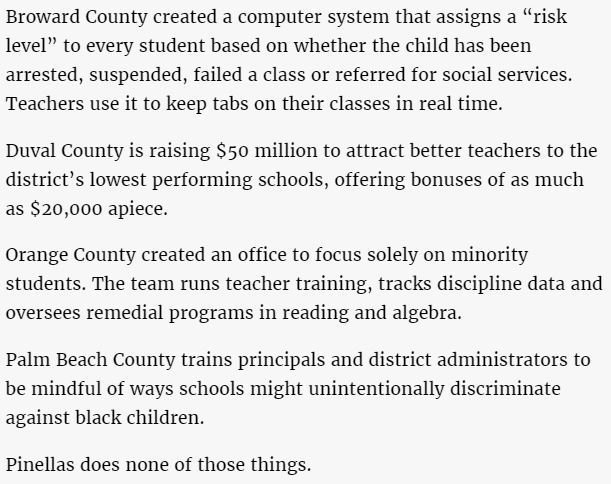separate - and still unequal
The Brass Tacks
How to identify solutions and use them as investigative findings; how to find stories about teachers; how to find stories
using student discipline data
using student discipline data
4 steps to finding solutions
The achievement gap isn't unique to any one school district. That means there are best practices and policies that other districts are using in your state. Go out and learn about them.
- Interview experts and get some sense of what they think best practices are. (We covered this in the earlier session.)
- Identify one or two like school districts and arrange to talk to whomever is in charge of closing the achievement gap.
- Go over your notes and identify the key policies or practices they described as being in place in their districts.
- Develop a set of questions and then survey as many districts as you can, being sure to cover the same questions for each.
- Here's the list of questions we developed.
Basically, you're structuring shoeleather reporting into a form of data, like a survey, that you can hover over and use to draw big-brush conclusions.
We did this over and over again for everything from policies aimed at closing the achievement gap to classroom safety and violence reduction policies to teacher retention policies.
now do a comparison
- Does my school district have any of these policies in place? Interview the person in charge of closing the gap.
- If not, why? Were they ever discussed and then not adopted? You'll need to know.
- If not, did my school district ever have any of these policies in place?
- Were they once adopted and then abandoned?
- This was a common occurrence in Pinellas.
- To answer these questions, you'll have to scrutinize meeting minutes and agenda packets, news clips and other sources.
this turns the solutions concept ...
... into potentially damning information about your school district. It became one of our main investigative findings in our first story:


one must-have database
for reporting on ... teachers
- Employee salary databases from your district
- Get as many years going back as you can.
- Year-over-year comparisons are important.
- Make sure it includes a start date, date of birth, job description and work site at a minimum.
- Ideally you want race, education level, college where degree was attained, home address, phone, email -- as much as you possibly can get. Here's an example.
- Can be used to track turnover, experience level, pay discrepancies and for many other creative uses ...
other stuff you can use
to report on teachers
- Personnel files
- Use to track in-district discipline histories.
- Try to get master lists or spreadsheets of all teachers with a discipline history.
- Substitute teacher data
- Who are subs, where are they going, and how often there?
- Union contracts
- Look for info on incentive pay, bonuses, etc.
- Bonus money for AP or IB teachers, but not for others?
don't forget ...
... That most teachers have to be certified by the state. That means there are a wealth of state records, if you can get your hands on them.
- Statewide discipline records.
- You don't just want the cases with substantiated findings. You want any case ever forwarded to the quasi-judicial body.
- Here's what the paperwork can look like.
- Certification exam scores
- Can you get them in your state?
- If so, it's worth it to learn who your failing-est teachers are, and where they are working.
two must-have databases for reporting on ... student discipline
- Incident-level discipline referral data for all schools districtwide.
- Probably won't have a unique identifier. But should have plenty of other information.
- Broken down by school.
- School-by-school student enrollment broken down by race.
- Combined, you can calculate discipline disparities.
schools don't exist in a vacuum
- Don't get bogged down in just requesting records and information from the school district.
- Police records will give you an unvarnished look at what goes on inside schools.
- Lists of calls for service will tell you how often police or sheriff's deputies are visiting the school in question, and for what. Here's an example.
- Keep in mind that some districts have both outside police and internal police agencies.
- School district police almost never get scrutiny. Yet they can file reports like this one.
- Use police reports in routine stories and features.
That's just where black people live. Right?
- Don't buy into that bullshit.
- Find out why the housing patterns in your community are the way they are.
- Search clips, including the kind that only exist on paper -- or on Google news archive.
- Visit local historical societies.
- Read masters' theses and doctoral dissertations.
a word on choice
- Get enrollment data on magnets in your district.
- Make sure you get several years' worth to look for trends.
- Scrutinize the policies surrounding those programs.
- We found that the best schools in our district were largely out of reach for black students.
- Because the district deliberately enacted policies against busing to the programs. And moved schools.
- Magnets and special programs, by and large, were started to integrate school systems voluntarily. Are fewer black and brown kids getting in than ever before?
- And are in-school programs really on-campus segregation?
Ok. how are things with you?
(Let's workshop some of this stuff.)
separate - and still unequal
By mlaforgia
separate - and still unequal
- 1,572




